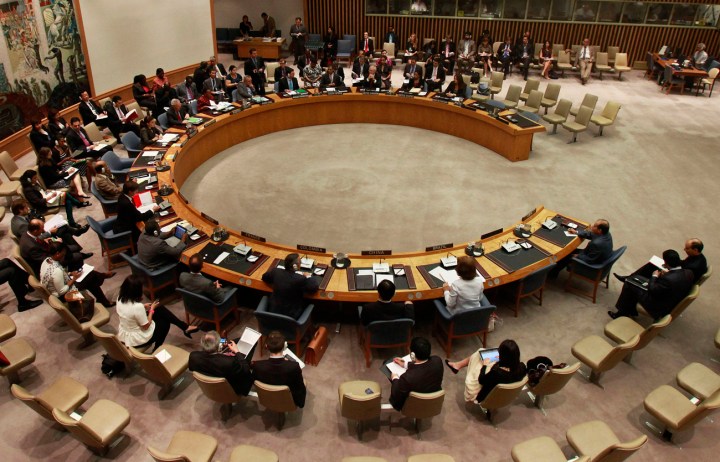Politics
Brics: UN Security Council’s newest power block

By a strange quirk of fate, all five members of Brics currently hold seats on the United Nations Security Council. Russia and China are the only permanent members of the council but with Brazil, India and South Africa all chorusing their lead, this group of emerging power have already caused consternation at the UN. By KHADIJA PATEL.
The United States, United Kingdom and France complain that the Brics nations have adopted an obstructionist approach that severely impedes the work of the council. The Brics maintain that they are not looking for a fight, only consistently raising legitimate concerns about the possibility of regime change. The Security Council then has become an unseemly battleground between the might of the world’s established powers and the ambition of emerging powers.
On Tuesday, Russia and China earned the outrage of Western powers when they vetoed a Security Council resolution against Syria. After expressing their reservations on the proposed resolution, South Africa, Brazil, India and Lebanon abstained from voting. Nine other nations voted in favour of the resolution. The text presented to the Council by the European nations on Tuesday called for “targeted measures” against Syria should President Bashar al-Assad persist in the crackdown against anti-government movements. The most recent UN figures claim at least 2,900 have been killed.
The veto has been met with outrage from the US, Europe and the Syrian opposition. The US described the failure of the Council as a slap in the face of the Syrian people. The French foreign minister, Alain Juppé, said the inaction of the Council was a “sad day” for Syrians and for the UN Security Council. The Syrian opposition warned that the failure of the international community to take action against al-Assad would lead to civil war. It was the American ambassador to the UN Susan Rice, however, who was especially outraged by the rare double-veto. She accused Russia and China, as well as the likes of South Africa, of feigning concerns about possible interpretations of the resolution as “a cheap ruse by those who would rather sell arms to the Syrian regime than stand with the Syrian people”.
The European members of the Council, Great Britain, France, Germany and Portugal were forced by Russia and China to abandon plans to propose a resolution that would see the United Nations enforce sanctions against Syria immediately. Russia and China, with the backing of by India, Brazil and South Africa, had already blocked a resolution calling for the imposition of sanctions. This time around, the European states anticipated opposition and watered down its draft resolution to satisfy the Council’s dissidents. The resolution that was eventually presented to the Council on Tuesday was a severely watered down version of the original. Instead of calling on UN members to impose sanctions against al-Assad immediately, the resolution was a censure of al-Assad’s military aggression against his people. Western powers have been criticised for displaying hypocrisy in the way it has responded to government aggression in Libya compared to Syria. Under pressure then to show that the intervention in Libya was not born out of selfish, strategic interests, the EU nations on the Council have vigorously pursued UN action against Syria. The volume of the outrage against the blunted resolution is then easily understandable.
It is the ambiguity implicit in “targeted measures” that was the resolution’s undoing. The European nations, backed up by the US, insist that these are a warning of the possibility of sanctions, but the Brics nations believe otherwise.
In an address to the Council on Tuesday, South Africa was particularly scathing of the agenda driving the resolution. “In the resolution before us, South Africa was concerned about the sponsors’ intention to impose punitive measures which would have prejudged the implementation of the resolution. We believe that these were designed as a prelude to further actions,” the South African representatives told the Council. The interpretation of resolution 1976, that enforced a no-fly zone over Libya, continues to be a sore point for South Africa. South Africa of course voted in favour of that resolution only to express grave disappointment in the manner Nato had eventually interpreted it. “We have seen that recently Security Council Resolutions have been abused and their implementation went far beyond the mandate of what was intended,” the South African position holds. “We were concerned that this resolution should not be part of a hidden agenda to yet again institute regime change, which has been a clearly stated objective by some. Accordingly, we are concerned that the sponsors of this resolution rejected language that clearly excluded military intervention in the resolution of the Syrian crisis.”
South Africa, like Brazil, urged an end to “all violence” but stopped short of endorsing al-Assad’s explanation that he was battling an armed insurrection. India however explicitly stated their belief in the right of a state to defend itself from an armed insurrection. India’s Permanent Representative to the UN, Hardeep Singh Puri, said, “States…have the obligation to protect their citizens from armed groups and militants. While the right of the people to protest peacefully is to be respected, states cannot but take appropriate action when militant groups, heavily armed, resort to violence against state authority and infrastructure.” India’s position may be understood from the perspective of its own problems in Kashmir. A resolution that slated al-Assad for his use of force against Syrians, without condemning the use of force by members of the opposition, may have set a precedent to the future disadvantage of India.
China believes that the resolution would have “blindly” pressured Syria without easing the situation. “Some countries submitted a draft resolution to blindly impose pressure and even threatened sanctions against Syria. This would not help to ease the situation,” Chinese foreign ministry spokesman Ma Zhaoxu said in a statement, quoted by AFP.
The most acerbic of criticism however has been directed at Russia. Russia choruses the South African concerns of the proposed sanctions being a pretext to military intervention as demonstrated in Libya. “We have warned more than once that we will strictly oppose any attempt to turn the ‘Libyan scenario’ into some sort of norm,” Russia’s foreign ministry was quoted by the Financial Times. “We are not lawyers for the regime of Bashar al-Assad,” the Russians are reported to have said, adding that Russia “definitely considers the continuing violence unacceptable and condemns the suppression of peaceful demonstrations. At the same time, we cannot ignore the fact that the radical opposition are increasingly profiting from the mood of protest among the population of Syria and no longer hide their extremist ideas, resorting to the tactics of outright terror.”
While China and Russia face the wrath of the Western powers for exercising their veto powers, American diplomats have warned that the lack of courage shown by Brazil, India and South Africa would severely dent the Brics nations’ chances of being accorded another permanent seat on the Council. It is clear that there is a widening gulf between the Western nations and the Brics nations on the Council. Nato’s military intervention is Libya has left the Brics embittered and allowed five disparate nations to club together in harmonious suspicion of Western ambitions. What remains to be gauged is how healthy it will prove to be for the Security Council to continue squabbling while pressing concerns in Syria, and elsewhere, remain unanswered. DM

Read more:
- Russia sparks outrage over Syria veto at UN in Financial Times;
- Russia’s Lavrov says BRICS aren’t looking for fight in Reuters;
- Syria vote: Was it really about Syria? In CNN;
- Russia, China should explain their veto to Syrians – Clinton in RIA Novosti (Russia);
- BRICS’ shows power by vetoing UN Syria text in FirstPost;
- No profile in courage: Syria, BRICS, and the U.N. Security Council in CNN.
Photo: REUTERS




 Become an Insider
Become an Insider